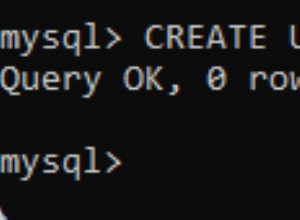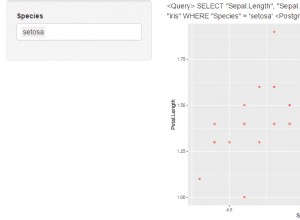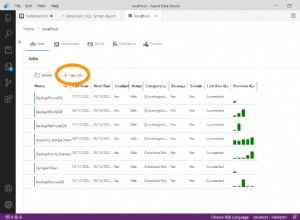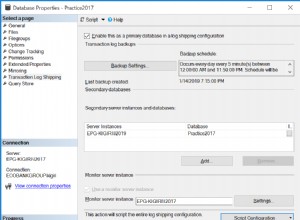Oracle 11 में, आप pivot . का उपयोग कर सकते हैं unpivot . के साथ क्लॉज खंड:
with
count_table as (
select 1001 device_id, 4 quantity from dual union all
select 1002 device_id, 20 quantity from dual union all
select 1003 device_id, 1 quantity from dual
),
device_table as (
select 1001 id, 'Yes' wifi, 'No' email, 'No' bluetooth from dual union all
select 1002 id, 'Yes' wifi, 'Yes' email, 'No' bluetooth from dual union all
select 1003 id, 'Unknown' wifi, 'Unknown' email, 'Yes' bluetooth from dual
)
----------------------------------------
select * from (
select
feature,
yes_no_unknown,
sum(quantity) quantity
from
count_table c join
device_table d on c.device_id = d.id
unpivot ( yes_no_unknown
for feature in (wifi, email, bluetooth)
)
group by
feature,
yes_no_unknown
)
pivot ( sum (quantity)
for yes_no_unknown in ('Yes' as yes, 'No' as no, 'Unknown' as unknown)
)
;
वैकल्पिक रूप से, आप दो मौजूदा तालिकाओं को एक तीसरी तालिका में शामिल करना चाह सकते हैं जिसमें तीन वांछित पंक्तियों के मान हों। इसे पढ़ना शायद थोड़ा आसान भी है:
with
count_table as (
select 1001 device_id, 4 quantity from dual union all
select 1002 device_id, 20 quantity from dual union all
select 1003 device_id, 1 quantity from dual
),
device_table as (
select 1001 id, 'Yes' wifi, 'No' email, 'No' bluetooth from dual union all
select 1002 id, 'Yes' wifi, 'Yes' email, 'No' bluetooth from dual union all
select 1003 id, 'Unknown' wifi, 'Unknown' email, 'Yes' bluetooth from dual
)
----------------------------------------
select
f.txt,
sum(case when ( f.txt = 'wifi' and d.wifi = 'Yes' ) or
( f.txt = 'email' and d.email = 'Yes' ) or
( f.txt = 'bluetooth' and d.bluetooth = 'Yes' )
then c.quantity
else 0 end
) yes,
sum(case when ( f.txt = 'wifi' and d.wifi = 'No' ) or
( f.txt = 'email' and d.email = 'No' ) or
( f.txt = 'bluetooth' and d.bluetooth = 'No' )
then c.quantity
else 0 end
) no,
sum(case when ( f.txt = 'wifi' and d.wifi = 'Unknown' ) or
( f.txt = 'email' and d.email = 'Unknown' ) or
( f.txt = 'bluetooth' and d.bluetooth = 'Unknown' )
then c.quantity
else 0 end
) unknown
from
count_table c join
device_table d on c.device_id = d.id cross join
(
select 'wifi' txt from dual union all
select 'email' txt from dual union all
select 'bluetooth' txt from dual
) f
group by
f.txt;




